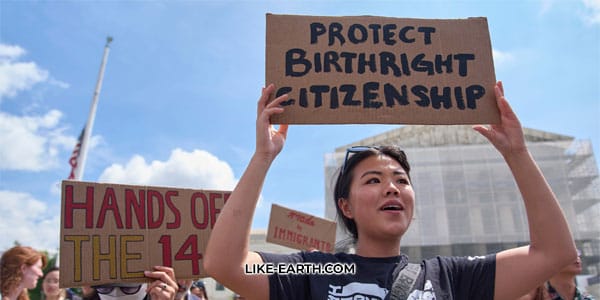Birthright Citizenship: Legal Rights and Current Debates in 2025

Birthright citizenship laws spark renewed debate in 2025 as global migration trends continue to reshape national identity and immigration policy across borders.
In a world where immigration continues to influence political and social structures, the concept of birthright citizenship stands as a central pillar in discussions about national identity and legal rights. This principle, enshrined in the U.S. Constitution under the Fourteenth Amendment, guarantees automatic citizenship to individuals born on U.S. soil, regardless of their parents’ immigration status. In 2025, this legal provision is once again under the microscope.
What Is Birthright Citizenship?
Birthright citizenship, also known as jus soli (“right of the soil”), grants citizenship to anyone born within a country’s territory. In the United States, this practice is protected by the Fourteenth Amendment, ratified in 1868. The amendment states: “All persons born or naturalized in the United States, and subject to the jurisdiction thereof, are citizens of the United States and of the State wherein they reside.”
This interpretation has withstood many legal challenges and remains a foundation of American constitutional law. However, as global migration increases, the implications of this right are being revisited by lawmakers and legal experts alike.
Why Is Birthright Citizenship Being Debated in 2025?
The year 2025 has seen a rise in immigration numbers globally, including across the U.S. southern border. Political leaders have revived discussions on whether the U.S. should continue granting automatic citizenship to children born to undocumented immigrants. Some argue that it encourages illegal immigration, while others maintain that altering this right would undermine constitutional protections.
Republican lawmakers in several states have introduced bills challenging the traditional understanding of the Fourteenth Amendment. Meanwhile, civil rights organizations argue that any change would lead to discrimination and statelessness for many children.
Global Perspectives on Birthright Citizenship
The United States is one of around 30 countries that offer unconditional birthright citizenship. Others, such as Canada and Mexico, maintain similar practices. However, most European and Asian nations follow the principle of jus sanguinis (“right of blood”), granting citizenship based on a parent’s nationality rather than place of birth.
In recent years, countries like the United Kingdom and Australia have introduced tighter restrictions, requiring at least one parent to be a citizen or legal resident for their child to gain citizenship. The U.S., therefore, stands increasingly alone in its unconditional application of jus soli.
Legal Challenges and Supreme Court Opinions
Although birthright citizenship is constitutionally protected, there have been numerous attempts to reinterpret or limit its scope. Legal scholars remain divided on whether Congress or the courts have the authority to redefine this right without a constitutional amendment.
In 2025, the Supreme Court has agreed to hear arguments in a high-profile case questioning the citizenship status of children born to non-citizen diplomats. While this specific situation involves a narrow group, the outcome could have ripple effects on broader policy interpretations.
Social and Economic Impacts
Opponents of birthright citizenship claim it places undue burden on public services, particularly in states with high immigration rates. Supporters counter that children born in the U.S. contribute to society, pay taxes, and deserve the full rights of citizenship.
Data from the U.S. Census Bureau and economic think tanks suggest that individuals born under birthright citizenship participate actively in the workforce, achieve higher educational levels, and often serve in the military. Removing this right could lead to a population of stateless individuals, which may strain social institutions even further.
Public Opinion and Political Ramifications
Polling conducted in early May 2025 shows a deeply divided electorate. Approximately 48% of Americans support maintaining birthright citizenship in its current form, while 42% believe it should be limited. The issue is expected to become a key talking point in the upcoming presidential debates and congressional elections.
Immigration rights groups have launched nationwide campaigns to educate voters on the history and importance of the Fourteenth Amendment. Meanwhile, conservative commentators argue that reform is necessary to maintain national security and order.
What’s Next?
As the legal, political, and social battles continue, the future of birthright citizenship remains uncertain. What is clear is that the discussion reflects broader questions about American values, national identity, and constitutional interpretation.
For the latest developments and in-depth updates on this evolving issue, visit our main news site.
Also, follow breaking news and community discussions on our official WhatsApp Channel.
Conclusion
The debate over birthright citizenship in 2025 is more than a legal technicality—it’s a reflection of the nation’s ongoing struggle to define what it means to be American. As courts, lawmakers, and citizens weigh in, the decision could shape immigration and nationality law for generations to come.
Share This Article
Let your friends know about this exciting news!



